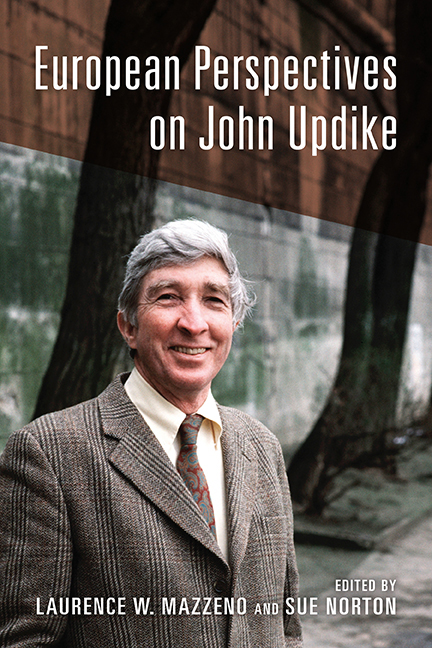Book contents
- Frontmatter
- Contents
- Acknowledgments
- List of Abbreviations
- Introduction: Updike as Europeans See Him
- Part I Coming of Age, Aging in Time
- Part II Love, American Style
- Part III Amazing Grace, American Faith
- 7 Psalmist of the Everyday: Late Updike, Aesthetics, and the Language of Praise
- 8 Guilt, Shame, and Hope in Updike's Short Fiction: “The Music School,” “Guilt-Gems,” and “Deaths of Distant Friends”
- 9 Signs of Omission? Socialist Erasure of Religion in John Updike's Work
- Part IV Old World Myths, New World News
- Sources for Further Study
- Notes on the Contributors
- Index
7 - Psalmist of the Everyday: Late Updike, Aesthetics, and the Language of Praise
from Part III - Amazing Grace, American Faith
Published online by Cambridge University Press: 15 August 2018
- Frontmatter
- Contents
- Acknowledgments
- List of Abbreviations
- Introduction: Updike as Europeans See Him
- Part I Coming of Age, Aging in Time
- Part II Love, American Style
- Part III Amazing Grace, American Faith
- 7 Psalmist of the Everyday: Late Updike, Aesthetics, and the Language of Praise
- 8 Guilt, Shame, and Hope in Updike's Short Fiction: “The Music School,” “Guilt-Gems,” and “Deaths of Distant Friends”
- 9 Signs of Omission? Socialist Erasure of Religion in John Updike's Work
- Part IV Old World Myths, New World News
- Sources for Further Study
- Notes on the Contributors
- Index
Summary
IN A RATHER ANTAGONISTIC ESSAY, “John Updike's Complacent God,” James Wood (1999) laments what he perceives as the absence of intensity from his subject's fiction. The creator of Rabbit Angstrom, he suggests, shares with his most famous protagonist a fondness for rest and tranquility that precludes both fervent belief and anguished doubt. “The result,” concludes Wood, “is a mild gratitude for reality rather than an irritable searching after metaphysics” (235). This is, to be sure, a curious allegation to level at a writer who is rare among major twentiethcentury authors in his dedication to an openly theological wrestling with questions of devotion, revelation, and ethics. Indeed, a wealth of criticism already engages with the rich range of religious ideas that animate the immense, fifty-year canon of Updike's collected fiction, poetry, memoir, and criticism. An entire edited collection has been dedicated to the subject of Updike's relationship with religion and, to borrow James Yerkes's (1999) subtitle, the writer's “sense of the sacred and the motions of grace.” Marshall Boswell is one of a number of scholars to address the significance of Soren Kierkegaard and Karl Barth, who, he notes, were not only fundamental to saving faith for Updike but “also provided him with a model for his own theological and aesthetic vision” (Boswell 2006, 43). A plethora of other critics have read Updike's work in relation to a variety of concepts and practices associated with belief including, for example, heresy (Duvall 1991; Tate 2008), redemption (Ralph Wood 1988), and sermons (Detweiler 1989). James Wood's apparent antipathy for Updike's fiction might suggest a disapproval of his unusual willingness to profess Christian belief, though the critic is clear that he is not proposing a conversion to atheism as a route to improving the work (235). More telling, however, is Wood's dismissal of what he terms “mild gratitude” as it implies an incomprehension regarding the primacy of thankfulness in Updike's writing and worldview.
Other critics, in contrast, take the writer's appreciative eye much more seriously.
- Type
- Chapter
- Information
- European Perspectives on John Updike , pp. 105 - 118Publisher: Boydell & BrewerPrint publication year: 2018



